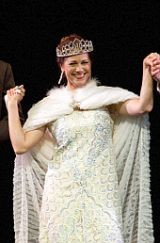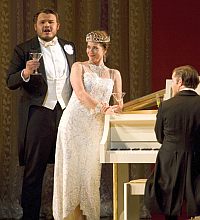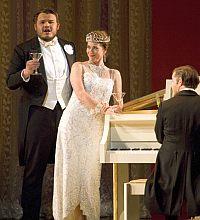
as Violetta Valéry
All photos by
Kristen Loken Anstey
Replacing the fine but hardly sterling Alfredo of Charles Castronovo is one of our great tenors of promise, young Adler Fellow David Lomelí. And singing a most convincing Germont, with a voice and bearing that make you wonder why the Met only casts him in secondary roles, is baritone Stephen Powell.
Futral first. Her voice is noticeably bigger, albeit less secure above high C than one of today’s other major coloraturas, Natalie Dessay, with whom she shares a gift for total ease, physical freedom, and convincing theatrics. Futral is also a beautiful woman who handles glamour better than Netrebko, and is far more convincing in her transition to tubercular suffering. Her voice may not be the most alluring when at full throttle — neither is Dessay’s, nor Netrebko’s, which, though quite beautiful on top, has grown dismayingly thick and leaden in the middle and lower registers — yet Futral handles it with consummate intelligence.
She appeared totally transported as she sang “Ah, fors’è lui” (Perhaps he is the one) and manic in the succeeding coloratura of “Sempre libera.” She was also heartrendingly pathetic in Violetta’s final hours. Time and again, her riveting, nuanced soft singing, which displays her voice at its finest, tugged at the heart.
Her performance in the final act, portraying Violetta's ultimate, tragic collapse, was riveting. True, Futral stabbed at the E-flat at the end of “Sempre libera,” rapidly correcting wayward pitch before spending no more than 1.25 seconds at her goal, but at least she gave it her all. Which, if equally true of Netrebko, makes you wonder whether she attained her current superstar status through media-induced mass hypnosis.
A Tenor of Huge Promise
Lomelí, who on other occasions has sounded like the Pavarotti of tomorrow, was audibly overhyped for his debut. He emoted too much at first, sharped on occasion, and put too much pressure on an instrument that, except for its shallow low range, can open and shine like the best. (Was his voice a bit tired, or was he under the weather? Maybe he was too excited to have slept well the night before.) The voice improved noticeably by the end of the first act. If Lomelí never sustained the levels of brilliance he displayed in last year’s Merola Grand Finale and Don Giovanni, he nonetheless gave indications of his potential
Elizabeth Futral (Violetta Valéry)
At present, Lomelí does not seem to know what to do with himself some of the time. In this regard, he would be wise to follow the model of Stephen Powell, as well as many of his tenor predecessors. When the director fails to give you something to do, stand in place, sing sincerely, and fill your body with energy rather than trying to figure out what to do with your hands.
Powell’s beautiful, totally in control instrument possesses a natural gravitas and maturity that make for an as-convincing-as-possible Germont. It is, in some respects, a thankless role, because it requires a baritone to display extreme degrees of odious, macho obliviousness and patriarchal self-righteousness before finally, far too late, exhibiting a modicum of humility.
Powell did all he could to try to slow down conductor Donald Runnicles’ speedy “Di Provenza il mar, il suol.” Although he surrendered in the second verse, his performance was more emotionally connected and less matter-of-fact than that of his mellifluous predecessor, Dwayne Croft. Which, given Croft’s greatness, is saying a lot. Here’s hoping we see Powell in more major roles in the future.
In his final production as San Francisco Opera’s music director, Runnicles drew even more moving, weeping playing from the strings and winds than on opening night. The overture and opening to the final act were especially tender and moving. It was a fine close to an often-distinguished tenure. He does seem to resort to strict time unless a singer takes charge and demands otherwise, though he can never be accused of inattention to color or slowing a production down.
Marta Domingo’s barebones production design is far more decorative than convincing. Claims of “luxury” at Violetta’s country house are ridiculous, and the all-purpose couch in the final act is insufficient. Similarly, having Alfredo lead Violetta onto the gaming table at Flora’s in order to better denounce her, or putting him at a distance from his dying beloved, does not convince.
In the end, it’s the singing that’s most important. In that regard, try to hear the same cast on July 2. If Lomelí sings as well as I trust he can, the performance will be a stunner.

